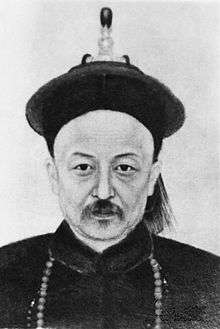Hong Jun
Hong Jun (traditional Chinese: 洪 鈞; simplified Chinese: 洪 钧; pinyin: Hóng Jūn; Wade–Giles: Hung Chün; died 1893) was a Chinese diplomat. From 1887 to 1890 he had served as a special emissary of the Qing dynasty government to Russia, Germany, the Netherlands, and Austria.[1]

History
In 1887 Hong Jun, then a major Chinese official, met Sai Jinhua ("Prettier Than Golden Flower") while he visited Suzhou.[2] At the time Hong Jun was in mourning due to his mother's death. Hong Jun made Sai Jinhua his concubine one year after meeting her. In April of that year, Sai Jinhua went to Beijing with Hong Jun.[3]
Empress Dowager Cixi appointed Hong Jun as the Chinese envoy to Europe, and so Hong Jun traveled to Russia, Austria, the Netherlands, and Germany as part of his diplomatic duties.[2] Sai Jinhua accompanied him because Hong Jun's wife was not willing to travel with him.[4] Sai Jinhua, with Hong Jun, lived in Europe for three years.[3] In Berlin Hong Jun mostly stayed in his residence when not attending his duties. When he did go outside, he went on walks on the Tiergarten. In Berlin Hong Jun did not allow Sai Jinhua to attend most of his parties, including those that he held at his residence. Hong Jun was opposed to European customs, especially those involving females and males associating with one another.[5] He did begin wearing European socks after initial vehemence against doing so when he discovered their comfort.[6]
David Der-wei Wang wrote that Hong Jun was dismissed from his position "for allegedly settling boundary disputes on the basis of twelve Russian maps of the Chinese border area that turned out to be faulty and thus made China lose land to Czarist Russia."[1] Hong Jun's term finished.[3] After the end of the diplomatic tour, the couple moved to Beijing.[2] There, Hong Jun was held a post in the Foreign Office (zongli yamen) and concurrently received an appointment to being the senior vice-minister of the Ministry of War.[3]
Sai Jinhua gave birth to her daughter Deguan (C: 德官, P: Déguān, W: Te-kuan) in 1890.[3] Hong Jun became sick and died in 1893,[3] shortly after his return to their home at 29 Xuanqiao Lane, Pingjiang Road, Suzhou.[7] In 1894 Sai Jinhua became a prostitute again because Hong Jun's relatives did not support her financially.[2] Sai Jinhua and Deguan traveled to Suzhou with the coffin of Hong Jun as his body was moved there.[3]
Views on race
After receiving insults from White Europeans at a church, Hong Jun said that Jesus was a Jew. He argued that like himself, Jesus had black hair and black eyes. Therefore, he accused them of insulting a fellow man of Jesus.[8]
Legacy
The character Jin Jun (Jin Wenqing) in Niehai Hua is based on Hong Jun.[1]
References
- Wan, Xianchu (translation: Poon Shuk Wah). "Sai Jinhua." In: Lee, Lily Xiao Hong and A. D. Stefanowska (editors of entire work). Ho, Clara Wing-chung (The Qing Period Editor). Biographical Dictionary of Chinese Women (中國婦女傳記詞典) The Qing Period, 1844-1911. M.E. Sharpe, January 1, 1998. ISBN 0765618273, 9780765618276.
- Wang, David Der-wei. Fin-de-siècle Splendor: Repressed Modernities of Late Qing Fiction, 1849-1911. Stanford University Press, 1997. ISBN 0804728453, 9780804728454.
- Zhang, Wenxian. "Sai Jinhua." In: Ditmore, Melissa Hope (editor). Encyclopedia of Prostitution and Sex Work, Volume 2. Greenwood Publishing Group, January 1, 2006. ISBN 0313329702, 9780313329708.
- Zhou, Xun. "Jews in Chinese Culture: Representations and Realities." In: Gilman, Sander L. and Milton Shain (editors). Jewries at the Frontier: Accommodation, Identity, Conflict. University of Illinois Press, January 1, 1999. Start page 224. ISBN 0252067924, 9780252067921.
Notes
- Wang, David Der-wei, p. 103.
- Zhang, Wenxian, p. 423.
- Wan, p. 182.
- Cheng, Joyce. "Who is Sai Jinhua?" (Archive) gbtimes. Wednesday September 11, 2013. Retrieved on November 26, 2013.
- Chang, Jung. Empress Dowager Cixi: The Concubine Who Launched Modern China (eBook). Alfred A. Knopf, New York, 2013. eBook ISBN 978-0-385-35037-2. p. 118. (quote marking the area around p. 118-120: "Her minister to Berlin, Hung Jun, was quite the opposite of Guo[...]") - Hardcover ISBN 978-0-307-27160-0
- Chang, Jung. Empress Dowager Cixi: The Concubine Who Launched Modern China (eBook). Alfred A. Knopf, New York, 2013. eBook ISBN 978-0-385-35037-2. p. 120. (quote marking the area around p. 118-120: "Her minister to Berlin, Hung Jun, was quite the opposite of Guo[...]") - Hardcover ISBN 978-0-307-27160-0
- "平江历史文化街区历史". Archived from the original on 26 August 2016. Retrieved 25 July 2016.
- Zhou, Xun, p. 232.
External links
- Jun Hong’s calligraphic hanging scroll - 洪鈞墨寶, Tse-Tsung Chow Collection of Chinese Scrolls and Fan Paintings (周策縱書畫卷軸與扇面收藏集), University of Wisconsin–Milwaukee